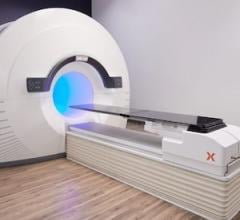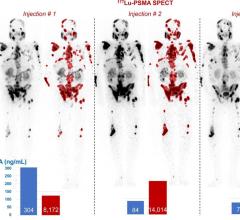June 9, 2014 — The prominent role a single enzyme plays in cancer imaging has eluded researchers for years, but not anymore. This discovery could pave new avenues in nuclear medicine. The enzyme, called neutral endopeptidase (NEP), has a way of breaking down most radiopeptide imaging agents in the body. Researchers have developed an elegant new concept that improves molecular imaging, according to study results presented during the Society of Nuclear Medicine and Molecular Imaging’s 2014 Annual Meeting.
The sneaky enzyme has evaded studies with peptide tracers until now because it dwells not in tested blood serum but along the walls of blood vessels and other tissues. In order to combat the degradation of circulating radiopeptides, researchers co-injected a NEP inhibitor called phosphoramidon, derived from bacteria, at the same time as an agent for imaging with single photon emission computed tomography and computed tomography (SPECT/CT). They then applied this method of enzyme inhibition in multiple imaging studies involving a range of radionuclide and peptide counterparts. The results of this research showed consistent success — up to 40 times the circulating radiopeptides when protected with phosphoramidon, compared to unprotected controls. This means the simple co-injection of an enzyme inhibitor promotes dramatically improved bioavailability and metabolic stability of radiopeptide imaging agents leading to higher uptake of the agent within targeted tumors and therefore better cancer imaging.
“Oncologists have long sought a powerful ‘magic bullet’ that can find tumors wherever they hide in the body so that they can be imaged and then destroyed,” said Marion de Jong, Ph.D., a principal researcher for this study conducted at Erasmus Medical Center in Rotterdam, The Netherlands in cooperation with NCSR ‘Demokritos’ Athens, Greece. “Following this innovative approach, we have been able to induce, for the first time, an impressive improvement in the level of circulating and viable radiopeptides, leading to a spectacular increase in tumor uptake. Enzyme-inhibition in the body could translate into higher diagnostic sensitivity and improved therapeutic efficacy of radiopeptide drugs in cancer patients.”
Not only were circulating radiopeptides increased in small animal models of varying tumor types, but the accumulation of radiopeptides also peaked at 14 times that of controls, which had not been treated with enzyme-inhibiting phosphoramidon. These results were clearly visualized by SPECT/CT imaging.
For more information: www.snmmi.org


 February 03, 2026
February 03, 2026 









